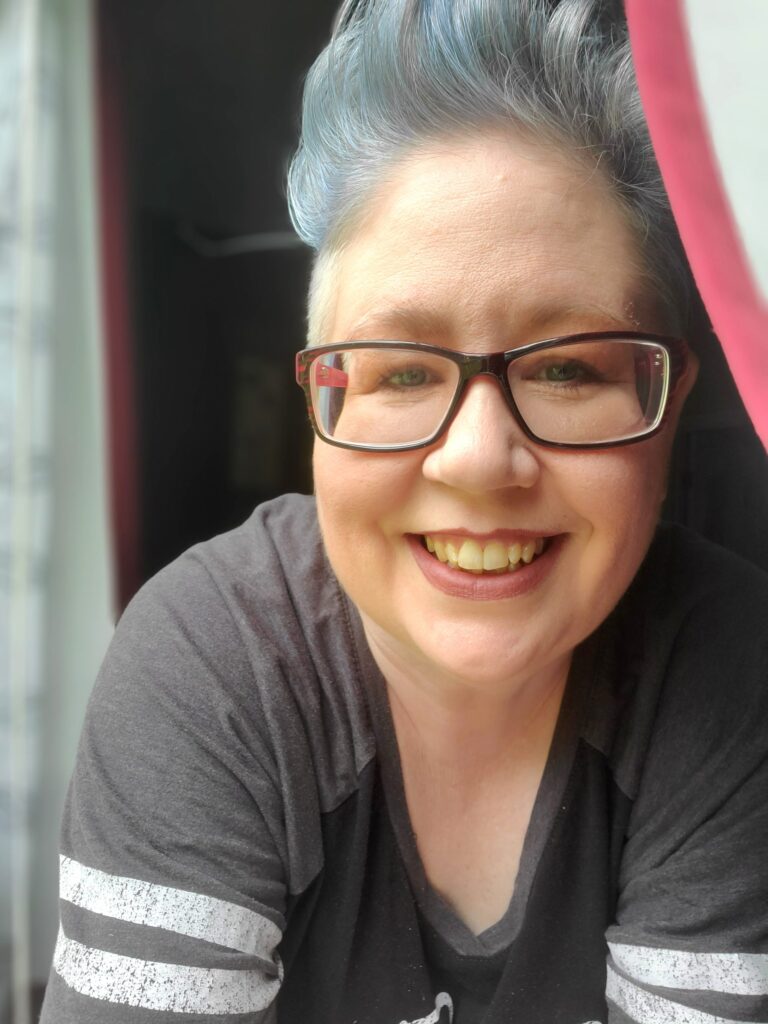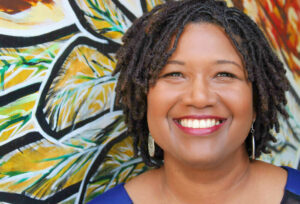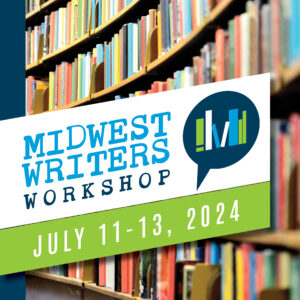Meet Saundra Mitchell
Saundra Mitchell (she/they) has been a phone psychic, a car salesperson, a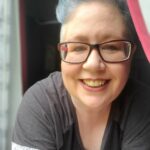 denture-deliverer and a layout waxer. She’s dodged trains, endured basic training, and hitchhiked from Montana to California. The author of nearly twenty books for tweens and teens, Mitchell’s work includes Edgar Award nominee SHADOWED SUMMER and Indiana Author Award Winner and Lambda Nominee ALL THE THINGS WE DO IN THE DARK. She is the editor of four anthologies for teens, DEFY THE DARK, ALL OUT, OUT NOW and OUT THERE. She always picks truth; dares are too easy.
denture-deliverer and a layout waxer. She’s dodged trains, endured basic training, and hitchhiked from Montana to California. The author of nearly twenty books for tweens and teens, Mitchell’s work includes Edgar Award nominee SHADOWED SUMMER and Indiana Author Award Winner and Lambda Nominee ALL THE THINGS WE DO IN THE DARK. She is the editor of four anthologies for teens, DEFY THE DARK, ALL OUT, OUT NOW and OUT THERE. She always picks truth; dares are too easy.
Saundra will be teaching “Building A Mystery” and “POV in YA” and participating in the panels, “Diversity/Inclusivity in Literature and Publishing” and “Live Long and Try to Prosper: The New Frontier of Artificial Intelligence and Creative Writing.” She is also a member of the Manuscript Evaluation team.
Check out the Full Faculty and the Conference Schedule…
…then visit our Registration Page!
Q&A with Saundra
I first encountered Saundra Mitchell through her teaching with the Indiana Writers Center, and read All the Things We Do in the Dark in one sitting. When I was planning the schedule and wanted an instructor to handle both mystery and YA, I knew that she was the number one candidate! She is an asset to MWW24 and attendees will benefit greatly from her sessions.
MWW: You’ll be leading a session about point of view in YA lit. What inspired you to explore different points of view in that genre, and how did it benefit the work? How will writers of genres outside of YA benefit from this class?
 SM: I think people assume that YA voice “requires” a certain POV, but it’s just not true. There’s a YA voice, but the POV should serve the story, not the category! I’ve written first person, present tense, third person omniscient, third person limited, and even dual POVs in YA, and I chose each of those because that’s what the story needed. I want to help writers feel more free to write their story the way their story needs to be told, definitely in YA, but also in any category or genre!
SM: I think people assume that YA voice “requires” a certain POV, but it’s just not true. There’s a YA voice, but the POV should serve the story, not the category! I’ve written first person, present tense, third person omniscient, third person limited, and even dual POVs in YA, and I chose each of those because that’s what the story needed. I want to help writers feel more free to write their story the way their story needs to be told, definitely in YA, but also in any category or genre!
MWW: Your session “Building a Mystery” sounds like an adventure. What do you mean by “you’re going to lie to yourself and others until the big reveal”? Do you know who did it before you begin, or is the “whodunnit” a surprise to you as well?
SM: I mean exactly what I say, except when I’m lying! A good mystery is never a straight-line speedrun to whodunit. It’s an intricate puzzle, and just like with puzzles, sometimes we have to try several strategies until we land on the right one. Whether an author knows the perp before they start writing, they should definitely know by the time they end. And if that’s a surprise, that means they’re going to have a good time revising that draft to make it a surprise for everyone else.
MWW: You were a great help to me in developing MWW24’s panel “Diversity/Inclusivity in Literature and Publishing.” Thank you! What are some of your goals for this panel, the ground you’d like to cover?
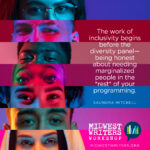 SM: I’m here for the death of the diversity panel! So often, these panels are thrown together because organizers realize they haven’t been inclusive in their programming choices and they don’t want to “get in trouble” or they fear “being canceled.” That means disparate authors in disparate categories and genres get thrown together, when the only thing they have in common is being marginalized.
SM: I’m here for the death of the diversity panel! So often, these panels are thrown together because organizers realize they haven’t been inclusive in their programming choices and they don’t want to “get in trouble” or they fear “being canceled.” That means disparate authors in disparate categories and genres get thrown together, when the only thing they have in common is being marginalized.
The work begins before the panel– being honest about needing marginalized people in the *rest* of your programming, and grouping people by their expertise instead of their marginalization. I’m always happy to talk about the challenges and triumphs for inclusion in publishing, but I have my pitchfork out and ready: Death of the Diversity Panel! Shelve us where we belong!
MWW: Our session on AI is an important one, and I’m looking forward to it. Have you had any experiences with AI in writing, and do you think there are positive aspects to its presence in literature?
SM: I think AI has its uses, but I also think that we need to build strong boundaries about how it’s used in creative work. We have no idea what work any given AI has been fed as its learning set, but we do know one thing: AI cannot *think*. It cannot *create*. It knows how to put sentences together because it’s “read” millions of words– but it can only spit out data it already has. Sometimes that data is plagiarized. Sometimes that data is dangerous. And AI, like children, repeats anything it learns without intention.
Chatbots are regularly tested online, and regularly yanked out of service because they learn in just a few hours or days, to reflect racist, sexist, homo- and transphobic language. AI is only as good as its dataset, and if you don’t know what data set your AI is using, you could unintentionally include damaging, hateful speech in your work.
AI is best used as a tool, because that’s what it is. It should never be used to create, because simply, it can’t. A hammer can’t saw through wood, and a pencil only draws a blueprint when a mind behind it puts it to paper.
MWW: Who are some authors who have influenced and/or inspired you?
SM: My earliest four influences are Katherine Patterson (Bridge to Terabithia taught me that sometimes bad things happen for no reason,) Stephen King (IT taught me that you can write about your own fears using mythology and magic,) S.E. Hinton (The Outsiders taught me that books can be mirrors– it was the first time I’d seen a neighborhood like mine in fiction,) and Annette Curtis Klause (The Silver Kiss taught me that happily ever after doesn’t have to be about romance; it can be about finally choosing yourself first.) I’m currently loving Ginny Sain Myers, Kate Alice Marshall, Leah Johnson, Tiffany D. Jackson, Kaylnn Bayron, Malinda Lo, Julian Winters, and Anna Marie McLemore.
Join us for #MWW24!
We’ve put together a broad range of workshops led by top-notch faculty so that you can reach new heights with your writing alongside brilliant writers from the Midwest and beyond!
*Attend online or in-person*
MWW is dedicated to building a community where writers can network with others and grow.

